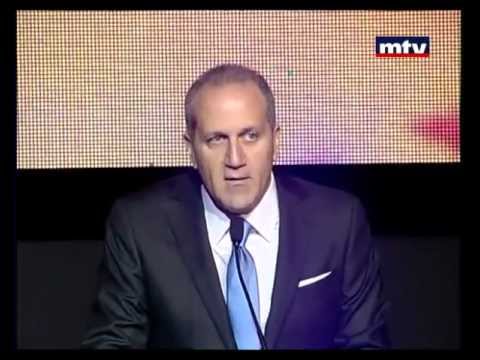
Lebanon’s financial prosecutor, Ali Ibrahim, charged Michel Gabriel Murr , Chairman and CEO of MTV and the Studio Vision company with embezzlement of public funds in the case of the illegal internet network in Zaarour in the highlands of the Metn district.
Telecommunications Minister Boutros Harb revealed the issue of unlicensed internet networks operating across Lebanon back in March, which he claimed Israel was using to spy on the country. Investigations have so far the networks in Oyoune al-Siman, the northern Dinnieh district, and the Faqra and Zaarour areas of Mount Lebanon.
In other news Tuesday, the parliamentary committee investigating the unlicensed internet issue said Lebanon’s military judiciary has taken over the case and will investigate Ogero head Abdel-Moneim Youssef as a suspect.
“The judiciary has taken the initial steps and a request has been put forward to pursue Abdel-Moneim Youssef to prove his role in squandering public money,” Health Minister Wael Abu Faour told reporters Tuesday. His comments came after a meeting of Parliament’s Telecommunications Committee meeting, attended by Harb and the committee’s head Hezbollah MP Hassan Fadlallah.
Youssef, the head of the state-run telecoms company, who Abu Faour’s Progressive Socialist Party and other groups have long called corrupt, has been accused of being involved in the case. Youssef did not immediately respond to a request for comment.
Fadlallah echoed Abu Faour’s remarks about pursuing Youssef during a joint news conference with Harb which the health minister did not attend. “The mobile operators owned by the state were buying internet from private companies at higher rates than those of the government,” Fadlallah said, referring to the two mobile phone companies, touch and Alfa. The implication was that both the state and consumers were faced with higher data costs than necessary. “We are doing what we promised and the public must trust us,” he added.
Harb explained that a lot of progress has been made in the investigation and said he was adamant that the case wouldn’t be closed before suspects were brought to justice.
“It is not true that all ministers in the Cabinet are evading their responsibilities in the absence of a head of state,” Harb said.
Fadlallah explained that the next date for discussions would be set once the state prosecutor returns from a trip abroad.
The Zaarour network, which Murr was allegedly connected to, was discovered and shut earlier this year, along with the three others that were detected in nearby areas. The judicial source said that the case has been referred to a judge in the Metn, adding that he could face up to three years in prison if found guilty.
Murr, the son of a former lawmaker and prominent businessman, gave his testimony to Ibrahim last month regarding the case.
MTV television station addressed the development in an opening comment on the evening news bulletin.
“Some people were aggravated when we battled their corruption, so they fabricated stories. … MTV will continue, no matter how many people bark. Our battle is long with the scandal,” the news anchor stated on Tuesday.
Hezbollah’s illegal network
The irony here according to analysts is that Hezbollah owns the largest illegal telecom network in the country . In May 2008, Hezbollah occupied the western part of Beirut and tried to occupy Mt Lebanon when the cabinet of former PM Fouad Siniora decided to remove the party’s telecommunications network.
Marwan Hamadeh who was the Telecom Minister at the time revealed in leaked cables that Hezbollah with the help of the Iranians installed an illegal fiber optics telecom network throughout Lebanon.
Network final step in creating Hezbollah state’
In a message sent to the US Embassy in Beirut, Hamadeh wrote that the network was a strategic win for Iran that established a direct link to Lebanon, which bypasses Syria.
“The value for Hezbollah is the final step in creating a nation state,” the memo read. “Hezbollah now has an army and weapons, a television station, an education system, hospitals, social services, a financial system and a telecommunications system.”
Hamadeh warned in his message that Hezbollah had indicated it would see any action against the telecommunications network as “equal to an Israeli act of aggression,” and that it would respond accordingly.
According to the memos, the network ran from Beirut to southern Lebanon, below the Litani River, through Palestinian refugee camps, Hezbollah training and areas under Christinan control, all the way the north of the country.
The Iranian Fund for the Reconstruction of Lebanon not only funded but also supervised the installation of the telecommunications lines, while paving new roads to replace the ones that were destroyed during the Hezbollah Israel war in 2006 .
On October 2011 Hezbollah threatened the residents of the upper Metn town of Tarshish after they had prevented the Shiite militant organization from installing its own private telecommunications network in the town.
The analysts are of the opinion that Hezbollah is more worried about the security of its own network than the loss of revenue for the state .
Leave a Reply
You must be logged in to post a comment.